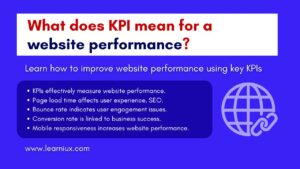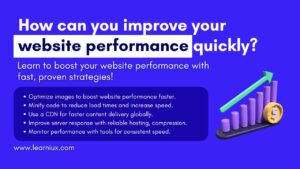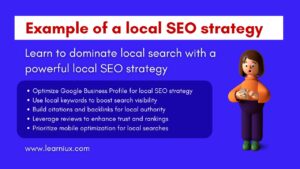What is Local SEO and Why It Matters
Local SEO is a specialized digital marketing strategy designed to increase a business’s visibility in local search results. Unlike traditional SEO, which targets a broad audience, local SEO focuses on connecting businesses with customers in their geographic area. This is achieved by optimizing your website, Google Business Profile, and online properties like local listings to rank higher when users search for nearby services or products. For example, local SEO ensures that your business appears prominently in the results when someone searches for “best coffee shop in Mumbai” or “plumber near me.”
The importance of local SEO is due to changes in consumer behavior. With the rise of smartphones, location-based searches have increased. Studies show that more than 80% of consumers use search engines to find local businesses, and a significant portion of these searches lead to in-store visits or purchases within a few hours. For small and medium-sized businesses, local SEO provides a direct way to tap into this highly targeted audience. It’s not just about being found; it’s about finding the right people at the right time – who are ready to engage with your business.
Local SEO is especially important for businesses with a physical presence, such as retail stores, restaurants, or service providers like electricians and salons. By optimizing for local search, you increase your chances of appearing in Google’s Local Pack, which are the top three results shown on Google Maps, which significantly increases visibility. Additionally, local SEO helps businesses compete with larger brands by leveling the playing field in their immediate area. For example, a small bakery in Pune can outperform a national chain for searches like “fresh cakes in Pune” with a well-executed local SEO strategy.
Beyond visibility, local SEO builds trust. Customers are more likely to choose businesses with accurate listings, positive reviews, and a strong online presence. A consistent and optimized local SEO approach signals credibility, encouraging potential customers to choose you over competitors. As search engines continue to prioritize local results, investing in local SEO has become a necessity for businesses that aim to thrive in their communities.
Benefits of Investing in Local SEO
Investing in local SEO offers a number of benefits that can transform the way your business attracts and retains customers. One of the primary benefits is increased visibility in local search results. When your business ranks high for queries like “dentist in Delhi” or “pizza delivery in Bangalore,” you’re drawing the attention of customers looking for your services. This increased visibility is achieved by appearing in the local pack, which is often the first place users see your business on Google’s search results page. Studies show that businesses in the local pack receive a significant portion of clicks, making them a prime place to drive traffic.
Another key benefit is the ability to attract highly targeted traffic. Local SEO focuses on users in your area who are more likely to convert into customers. Unlike broad marketing campaigns that cast a wide net, local SEO focuses on people searching for specific services nearby. For example, a gym in Chennai that optimizes for “fitness classes in Chennai” will attract local residents who are ready to sign up instead of wasting resources on users outside their service area. This targeted approach results in higher conversion rates, whether it’s through more foot traffic, phone calls, or online bookings.
Local SEO is also cost-effective, making it ideal for small businesses with limited budgets. Unlike paid advertising, which requires ongoing costs, local SEO focuses on organic growth. Once your website and listings are optimized, they can maintain visibility with minimal ongoing costs. For example, updating your Google Business Profile or posting regular content can yield long-term results without the recurring costs of pay-per-click campaigns. This makes local SEO a sustainable investment for businesses looking to maximize their marketing dollars.
Additionally, local SEO builds credibility and trust. Positive customer reviews, consistent business information, and high rankings signal to customers that your business is reputable. When potential customers see your business listed with glowing reviews and accurate details, they are more likely to trust you. Responding to reviews – both positive and negative – further demonstrates your commitment to customer satisfaction, builds loyalty, and encourages repeat business. In a competitive market, this trust can set you apart.
Finally, local SEO helps businesses stay competitive in their local markets. Even in crowded industries, a strong local SEO strategy can help you stand out. By focusing on specific keywords, unique offerings, and local relevance, you can differentiate your business from competitors. For example, a pet store in Hyderabad can optimize “organic pet food in Hyderabad” to appeal to a specific audience, even though larger chains dominate broad search terms.
How to Build a Successful Local SEO Strategy
Building an effective local SEO strategy requires a combination of technical optimization, content creation, and ongoing management. The first step is to optimize your Google Business Profile, which serves as the cornerstone of local SEO. Make sure your profile is fully completed with accurate details, including your business name, address, phone number, website, and hours of operation. Add high-quality photos of your products, services, or storefront to make your profile visually appealing. Post regular updates like promotions or events to keep your audience engaged. Responding promptly to customer reviews also increases the credibility of your profile and improves your local SEO rankings.
Next, focus on incorporating local SEO keywords into your website. Look for keywords that reflect your business and location, such as “flower shop in Kolkata” or “car repair in Ahmedabad.” Use these keywords naturally in your website titles, meta descriptions, headers, and content. Creating location-specific landing pages can further increase your visibility. For example, a roofing company in Bengaluru can create separate pages for “Roof Repair in Koramangala” and “Roof Repair in Whitefield” to target different localities. Blog posts that address local topics like “Top 5 Home Maintenance Tips for the Mumbai Monsoon” can also attract a local audience.
Consistency is another important factor in local citations. A citation is a mention of your business’s name, address, and phone number on online directories like JustDial, Yelp, or industry-specific platforms. Make sure this information is consistent across all platforms to avoid confusing search engines or customers. Inconsistent data like different phone numbers or addresses can hurt your local SEO performance. Audit your citations regularly to maintain accuracy, and create new ones on relevant directories to increase your authority.
Customer reviews play a key role in local SEO. Encourage satisfied customers to leave reviews on your Google Business Profile and other platforms. Make it easy by providing direct links or QR codes. Respond professionally to all reviews, thank customers for positive feedback, and address concerns in negative ones. Reviews not only affect rankings but also influence customer decisions, with many users trusting online reviews as much as personal recommendations.
Mobile optimization for local SEO is a no-brainer. Most local searches happen on mobile devices, so your website should be responsive, fast-loading, and easy to navigate. Test your site’s mobile performance using tools like Google’s Mobile-Friendly Test and fix any issues like slow load times or confusing layouts. A seamless mobile experience ensures users stay on your site longer, which increases the likelihood of conversions and signals to search engines that your site is optimized for local SEO.
Leverage local link-building to strengthen your strategy. Partner with local businesses, sponsor community events, or contribute guest posts to local blogs to gain backlinks. These links signal to search engines that your business is a trusted part of the community, which increases your local SEO rankings.
Challenges and Considerations in Local SEO
While local SEO offers significant benefits, businesses face challenges. One major hurdle is adapting to search engine algorithm changes. Google frequently updates its algorithms, which can impact local SEO rankings. It’s important to stay informed of these changes and adapt your strategy accordingly. For example, updates may prioritize certain ranking factors, such as review volume or mobile usability, which may require you to adjust your approach.
Another challenge is the time and effort required for local SEO. Unlike paid advertising, which can produce immediate results, local SEO is a long-term strategy. Optimizing your website, building citations, and earning reviews requires consistent effort, and it can take months for significant results to materialize. Businesses must be patient and committed to seeing the full impact of their local SEO investments.
Competition in high-density areas can also make local SEO challenging. In urban markets like Mumbai or Delhi, businesses may face stiff competition from established players or large chains. To overcome this, focus on specific keywords and unique selling points. For example, a boutique in Gurgaon could target “sustainable fashion in Gurgaon” to attract a specific audience, rather than competing for broad terms like “clothing store.”
Resource constraints can also pose a challenge, especially for small businesses. Local SEO requires ongoing tasks like content creation, review management, and profile updates, which can strain limited staff or budgets. Consider outsourcing to a local SEO expert or using affordable tools to streamline the efforts. Prioritizing high-impact tasks like Google Business Profile optimization can also help boost results with minimal resources.
Is Local SEO Right for Your Business?
Local SEO is ideal for businesses that rely on local customers, such as brick-and-mortar stores, restaurants, or service-based companies like plumbers or tutors. If your revenue comes primarily from a specific geographic area, local SEO can drive targeted traffic and increase sales. For example, a yoga studio in Jaipur would benefit greatly from ranking for “yoga classes in Jaipur,” since most of its clients are local residents.
However, local SEO may not be the best focus for businesses with a national or global audience. E-commerce stores or online service providers that target broad markets may prefer traditional SEO or paid advertising instead. To determine if local SEO is right for you, evaluate your customer base and business goals. If your audience is local and you’re aiming to increase foot traffic or local inquiries, local SEO is a worthwhile investment.
Consider your industry as well. Some sectors, such as hospitality or retail, benefit more from local SEO because they rely on in-person visits. Conversely, businesses that offer digital products, such as software or online courses, may find less value without targeting specific regions. Assessing your needs and tailoring your strategy to your target audience will ensure that you invest in the right approach.
Measuring the Impact of Local SEO
To measure whether local SEO is worth the investment, track key performance indicators (KPIs) that reflect its impact. Start with your local search rankings. Monitor how your business ranks for targeted keywords like “bakery in Hyderabad” or “dentist in Pune” using tools like Google Search Console. High rankings indicate that your local SEO strategy is working.
Website traffic from local searches is another important metric. Use Google Analytics to track visits from location-based queries and assess whether they lead to actions like form submissions or phone calls. Conversion rates, such as bookings or purchases, provide insight into how effectively your local SEO efforts are driving business results.
Foot traffic is a valuable KPI for businesses with physical locations. Tools like Google Business Profile Insights can show how many users asked for directions to your store or called your business after finding you in search results. Customer reviews and their sentiment also indicate success, as positive feedback can boost both rankings and trust.
Set realistic expectations when measuring results. Local SEO is a gradual process, and while some improvements may appear in a few weeks, it often takes three to six months to see significant gains. Review your KPIs regularly and adjust your strategy to address any weaknesses, such as low review volume or outdated listings.
Tips for Maximizing Local SEO Investment
To make the most of local SEO, take a proactive and consistent approach. Update your Google Business Profile regularly with fresh photos, posts, and accurate information to stay relevant. Interact with your audience by responding to reviews and answering questions promptly. This not only improves your rankings but also builds a positive brand image.
Invest in high-quality, localized content. Create blog posts, videos, or social media content that your local audience will love. For example, a restaurant in Goa could share a blog post about “Top 5 Dishes to Try in Goa This Season” to attract local foodies. This content can also be shared on social media to increase your reach.
Monitor your competitors’ local SEO strategies. Analyze their Google Business Profiles, keywords, and reviews to identify opportunities to differentiate your business. For example, if a competitor lacks detailed service descriptions, you can fill that gap with comprehensive, keyword-rich content.
If you lack the time or expertise to manage your strategy, consider working with a local SEO professional. They can handle technical tasks like schema markup or citation building while you focus on running your business. Alternatively, use tools like Moz Local or SEMrush to streamline tasks and track progress.
Conclusion
Investing in local SEO is a powerful way to grow your business by connecting with customers in your community. It offers increased visibility, targeted traffic, cost-effective marketing, and increased credibility, making it a smart choice for businesses that rely on a local audience. While challenges like algorithm changes and competition exist, a well-executed local SEO strategy can deliver long-term results that significantly impact your bottom line.
To be successful, focus on optimizing your Google Business Profile, use local keywords, maintain consistent citations, and encourage reviews. Prioritize mobile optimization and track your progress with relevant KPIs to ensure your efforts are successful. Whether you’re a small retailer, restaurant, or service provider, local SEO can help you stand out in your field and drive meaningful growth. Get started today by assessing your current online presence and taking steps to enhance your local SEO strategy.
FAQs
What is local SEO and how is it different from traditional SEO?
Local SEO is a digital marketing strategy that focuses on optimizing a business’s online presence to attract customers in a specific geographic area. Unlike traditional SEO, which targets a broad audience across regions or countries, local SEO focuses on location-based searches, such as “bakery near me” or “plumber in Mumbai.” It involves optimizing your Google Business Profile, website, and local citations to rank higher in local search results, particularly in Google’s Local Pack. This makes it ideal for businesses with physical locations or businesses that serve a defined area. Traditional SEO, on the other hand, emphasizes broad keywords and global visibility, often for e-commerce or digital businesses. Local SEO prioritizes proximity and relevance to local searchers, ensuring that your business connects with customers nearby. By focusing on local intent, it increases foot traffic and conversions from users who are ready to engage. For small businesses, local SEO is often more effective and cost-effective than broad SEO strategies. It builds trust through local reviews and relevant information, making it a key tool for community-based businesses.
Why should my small business invest in local SEO?
Investing in local SEO is important for small businesses because it increases visibility among nearby customers who are actively searching for your services. For example, a well-optimized business can appear in the top local search results when someone searches for “coffee shop in Delhi,” which increases traffic. Local SEO targets high-intent customers, which leads to higher conversion rates compared to broad marketing efforts. It’s also cost-effective, relying on organic strategies like optimizing your Google Business Profile and getting reviews, which require minimal ongoing costs. This makes it ideal for businesses with limited budgets. Additionally, local SEO helps you compete with larger brands by leveling the playing field by focusing on your niche. It builds credibility through positive reviews and consistent listings, building trust with potential customers. By aligning with local search trends, your business can build a loyal customer base and increase revenue. Ultimately, local SEO is a sustainable way to grow your presence in your community.
How does local SEO help drive traffic to my store?
Local SEO enhances your location profile by ensuring your business appears in location-based searches when customers are close to you and ready to visit. Optimizing your Google Business Profile with accurate descriptions, photos, and regular updates makes your business more attractive in search results like Google Maps. Appearing in the local pack, which is the top three results on Google, significantly increases visibility and click-through rates. Local SEO also targets mobile users, who often search for services like “restaurants near me.” By including local keywords and maintaining consistent citations, your business ranks high for these queries, guiding customers straight to your door. Positive reviews and engaging posts encourage visits by building trust and showcasing your offerings. Tools like Google Business Profile Insights can track how many users ask for directions to your store, showing a direct link between local SEO and foot traffic. For businesses like retail or cafes, this targeted approach can lead to a measurable increase in in-store visits.
What are the key components of a successful local SEO strategy?
A successful local SEO strategy involves several key components that work together to increase your visibility. First, optimize your Google Business Profile with accurate descriptions, high-quality photos, and regular posts to attract customers. Include local SEO keywords like “dentist in Pune” in your website content, meta descriptions, and landing pages to target local searches. Consistent local citations in directories like Justdial or Yelp ensure that search engines trust your business information. Encouraging and responding to customer reviews is crucial, as reviews influence rankings and customer trust. Mobile optimization is essential, as most local searches occur on smartphones, requiring a fast, responsive website. Building local backlinks through partnerships or community involvement strengthens your authority. Regularly auditing your online presence for accuracy and monitoring performance with tools like Google Analytics ensures continued success. By combining these elements, your local SEO strategy can drive targeted traffic and growth.
How long does it take to see results from local SEO?
Local SEO is a long-term strategy, and the timing of results depends on factors such as competition and optimization efforts. Typically, businesses can see initial improvements, such as better rankings or increased website traffic, within three to six months. Optimizing your Google Business Profile and gaining reviews can help you gain visibility in local search results quickly, sometimes within weeks. However, it can take six months or more to reach the top rankings in competitive markets, especially in urban areas with many similar businesses. Consistency is key – regular updates, content creation, and citation management contribute to steady progress. Monitoring KPIs like local search rankings and foot traffic helps measure success over time. While local SEO requires patience, its results are sustainable, providing long-term visibility without the recurring costs of paid advertising. Businesses that are committed to ongoing optimization see stronger, more consistent results. Staying proactive ensures that your efforts are compounded for lasting results.
Is local SEO expensive compared to other marketing strategies?
Local SEO is generally more cost-effective than other marketing strategies, especially for small businesses. Unlike paid advertising, which requires ongoing spending on platforms like Google Ads, local SEO focuses on organic growth with minimal ongoing costs. Key tasks like optimizing your Google Business Profile, creating local content, and managing reviews can often be done in-house with no direct cost. Hiring a local SEO professional or using tools like Moz Local is also cheaper than running large-scale advertising campaigns. Long-term benefits like continued visibility in local search results make it a high-value investment. For example, appearing in local packs can increase traffic without additional cost. While it requires time and effort, local SEO avoids the recurring costs of traditional advertising. Compared to broad SEO or social media advertising, it offers a targeted approach that maximizes returns for businesses that serve local customers.
How do customer reviews affect local SEO?
Customer reviews are a key factor in local SEO, influencing both search rankings and customer decisions. Positive reviews on platforms like Google Business Profile tell search engines that your business is trustworthy and relevant, boosting your ranking in local search results. The quantity, quality, and recency of reviews all play a role in how search engines evaluate your business. For example, a steady stream of recent, high-star reviews can help you rank higher for queries like “best salon in Bengaluru.” Reviews build trust with potential customers, as many rely on them as much as personal recommendations. Responding to both positive and negative reviews shows engagement and improves your reputation. Encouraging satisfied customers to leave reviews through follow-up emails or QR codes can increase your review volume. A strong review profile not only boosts local SEO, but also increases conversions by convincing users to choose your business.
Can Local SEO Help My Business Compete with Big Brands?
Yes, local SEO is a powerful tool for small businesses to compete with big brands in their area. By focusing on location-specific keywords and optimizing your Google Business Profile, you can rank higher for searches like “bookstore in Chennai,” even against national chains. Local SEO levels the playing field by prioritizing proximity and relevance, allowing you to dominate your immediate area. For example, a local cafe can outrank a global chain by targeting specific terms like “organic coffee in Hyderabad.” Consistent citations and positive reviews further increase your credibility, making your business seem more trustworthy to local customers. Interacting with the community through local content or partnerships also sets you apart. Big brands may have bigger budgets, but local SEO allows you to focus on your unique offering and local relevance. This targeted approach helps attract customers who prefer to support local businesses.
What role does mobile optimization play in local SEO?
Mobile optimization is essential for local SEO because most local searches happen on smartphones. Users searching for “restaurants near me” or “car repair in Kolkata” expect fast, user-friendly websites that work seamlessly on their devices. A mobile-optimized website with fast load times, responsive design, and easy navigation improves the user experience, reduces bounce rates, and increases conversions. Search engines like Google prioritize mobile-friendly sites in their rankings, especially for local searches. Optimizing your Google Business Profile for mobile with clear call-to-action buttons like “Call” or “Directions” also increases engagement. Tools like Google’s Mobile-Friendly Test can fix issues like small text or slow loading. A seamless mobile experience ensures you capture high-intent customers on the go. Ignoring mobile optimization can hurt your local SEO performance and drive users to your competitors. This is a key component to staying competitive in local search.
How do I measure the success of my local SEO efforts?
Measuring local SEO success involves tracking key performance indicators that reflect visibility and engagement. Monitor your local search rankings for keywords like “florist in Mumbai” using tools like Google Search Console to see if you’re showing up in the local pack or top results. Website traffic from local searches, tracked by Google Analytics, shows how many users find you through location-based queries. Conversion metrics, such as form submissions, phone calls, or bookings, show whether this traffic leads to business results. Google Business Profile Insights provides data on actions like direction requests or calls, which directly links local SEO to foot traffic. Review volume and sentiment also reflect the impact of your strategy, as more positive reviews increase rankings and trust. Compare these metrics regularly to your goals to assess progress. Results may take months to see, but consistent tracking helps you refine your approach for better results.





















































